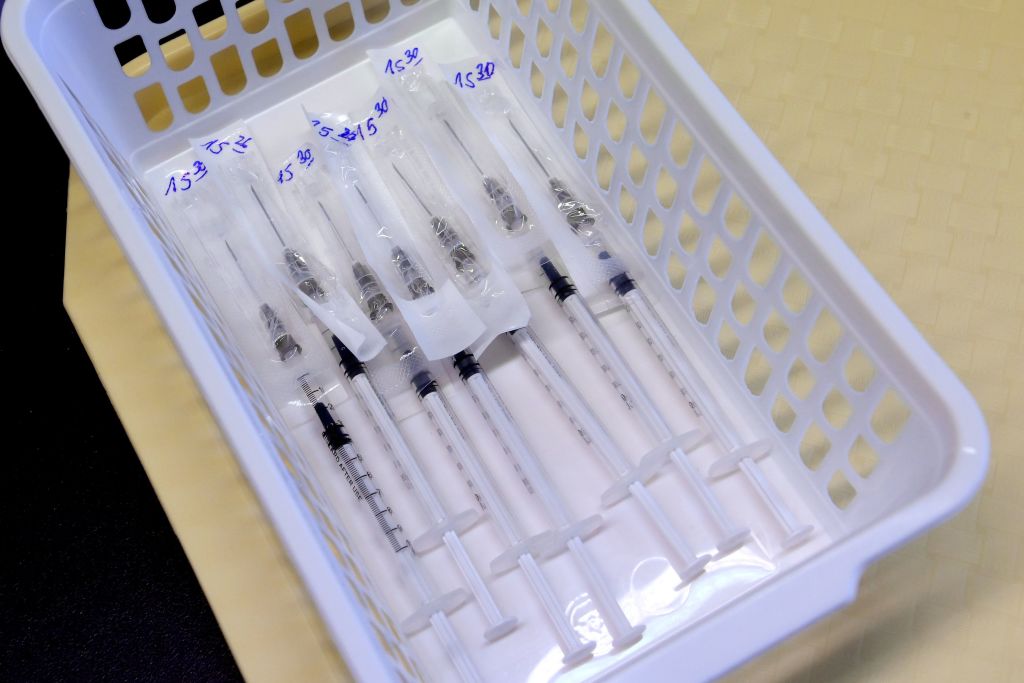Scientists home in on potential cause of rare COVID-19 vaccine allergic reactions


A free daily email with the biggest news stories of the day – and the best features from TheWeek.com
You are now subscribed
Your newsletter sign-up was successful
Scientists are homing in on the potential cause of allergic reactions to the Pfizer-BioNTech COVID-19 vaccine.
The United States Centers for Disease Control and Prevention has recorded six severe allergic reactions (all of which were treated successfully) out of the 272,001 doses administered through Dec. 19, and the compound polyethylene glycol, known as PEG, has become a leading suspect in the cases, The Wall Street Journal reports. While still speculative at this point — allergies to PEG are rare and the reactions may have been to something else, per the Journal — PEG is found in other drugs, cosmetics, and food and is known to trigger anaphylaxis on rare occasions, though not all forms of the compound are "equal" in terms of allergic potential.
Part of the challenge of pinpointing PEG as the likely catalyst for the reactions is that the compound in the vaccines "is different than what has been previously associated with allergic reactions," James Baker, an immunologist who heads the Michigan Nanotechnology Institute for Medicine and the Biological Sciences at the University of Michigan, told the Journal.
The Week
Escape your echo chamber. Get the facts behind the news, plus analysis from multiple perspectives.

Sign up for The Week's Free Newsletters
From our morning news briefing to a weekly Good News Newsletter, get the best of The Week delivered directly to your inbox.
From our morning news briefing to a weekly Good News Newsletter, get the best of The Week delivered directly to your inbox.
PEG is also found in the Moderna vaccine. A health care worker became the first known person to experience an allergic reaction to that shot on Thursday. Dr. Hossein Sadrzadeh, who said he has a history of allergies, reported tingling sensations, an elevated heart rate, and low blood pressure shortly after his inoculation. The symptoms were akin to a reaction he had previously had to shellfish, he said. He was discharged a few hours later.
The incidents, while concerning, are rare — more than 1 million Americans have been vaccinated — and scientists and public health officials maintain the vaccines are safe, effective, and crucial to ending the pandemic. Read more at The Wall Street Journal and CNN.
A free daily email with the biggest news stories of the day – and the best features from TheWeek.com
Tim is a staff writer at The Week and has contributed to Bedford and Bowery and The New York Transatlantic. He is a graduate of Occidental College and NYU's journalism school. Tim enjoys writing about baseball, Europe, and extinct megafauna. He lives in New York City.
-
 AI surgical tools might be injuring patients
AI surgical tools might be injuring patientsUnder the Radar More than 1,300 AI-assisted medical devices have FDA approval
-
 9 products to jazz up your letters and cards
9 products to jazz up your letters and cardsThe Week Recommends Get the write stuff
-
 ‘Zero trimester’ influencers believe a healthy pregnancy is a choice
‘Zero trimester’ influencers believe a healthy pregnancy is a choiceThe Explainer Is prepping during the preconception period the answer for hopeful couples?
-
 Trump HHS slashes advised child vaccinations
Trump HHS slashes advised child vaccinationsSpeed Read In a widely condemned move, the CDC will now recommend that children get vaccinated against 11 communicable diseases, not 17
-
 FDA OKs generic abortion pill, riling the right
FDA OKs generic abortion pill, riling the rightSpeed Read The drug in question is a generic version of mifepristone, used to carry out two-thirds of US abortions
-
 RFK Jr. vaccine panel advises restricting MMRV shot
RFK Jr. vaccine panel advises restricting MMRV shotSpeed Read The committee voted to restrict access to a childhood vaccine against chickenpox
-
 Texas declares end to measles outbreak
Texas declares end to measles outbreakSpeed Read The vaccine-preventable disease is still spreading in neighboring states, Mexico and Canada
-
 RFK Jr. shuts down mRNA vaccine funding at agency
RFK Jr. shuts down mRNA vaccine funding at agencySpeed Read The decision canceled or modified 22 projects, primarily for work on vaccines and therapeutics for respiratory viruses
-
 Measles cases surge to 33-year high
Measles cases surge to 33-year highSpeed Read The infection was declared eliminated from the US in 2000 but has seen a resurgence amid vaccine hesitancy
-
 Kennedy's vaccine panel signals skepticism, change
Kennedy's vaccine panel signals skepticism, changeSpeed Read RFK Jr.'s new vaccine advisory board intends to make changes to the decades-old US immunization system
-
 Kennedy ousts entire CDC vaccine advisory panel
Kennedy ousts entire CDC vaccine advisory panelspeed read Health Secretary RFK Jr. is a longtime anti-vaccine activist who has criticized the panel of experts
